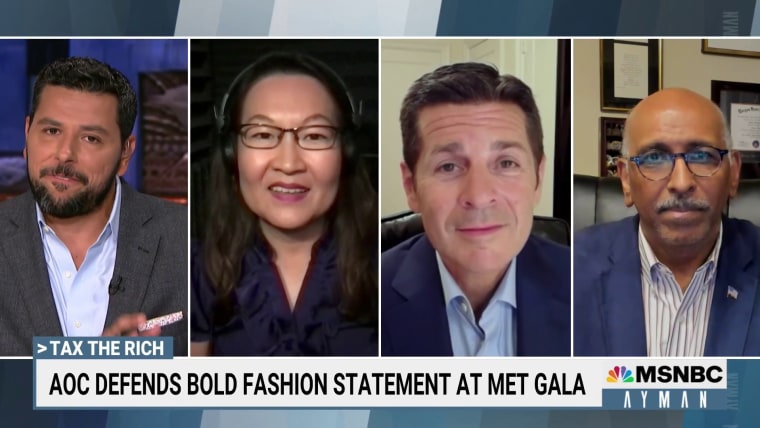Jesus taught that “it is easier for a camel to go through the eye of a needle than for someone who is rich to enter the kingdom of God.” His words came to mind as I watched Jeff Bezos board his private spaceship in July. It seems easier today for a billionaire to launch himself into space than for Congress to increase taxes on rich people.
This isn’t just good policy or good politics, it’s also good Christian ethics.
Thankfully, Congress is now considering how to raise taxes on wealthy people and corporations to fund historic investments in President Joe Biden’s Build Back Better agenda. This isn’t just good policy or good politics, it’s also good Christian ethics.
Many Christians in the United States — and Americans writ large — favor raising taxes on rich people and corporations, according to recent polls. Sixty percent of self-identifying Christians believe upper-income people pay too little in taxes, according to an April Morning Consult/Politico poll, while 62 percent of Christians believe corporations pay too little in taxes. And 77 percent of Christians in the same poll agreed that the wealthiest Americans should pay higher taxes, while 71 percent said the same about corporations. According to another spring poll, from Americans for Tax Fairness, 60 percent of Protestants and 68 percent of Catholics support raising taxes on the wealthy and corporations.
Sept. 19, 202112:19
According to a Navigator Research survey from August, some of the most popular provisions of Biden’s Build Back Better plan among Christians included expanding Medicare to include dental, vision and hearing coverage (84 percent support); raising wages for home care workers who help with older, injured and disabled patients (76 percent support); and investing in clean energy infrastructure, like solar panels and wind turbines (67 percent support).
Too often, Christian politics gets reduced to abortion and same-sex marriage. This dynamic has always struck me as odd, since Jesus never talked about those topics. The Gospels do record him consistently speaking out about economic justice, though. Drawing attention to Christian support for raising taxes and increased spending on social programs helps reorient our public discourse to the issues Jesus actually cared about.
“For years, tax-dodging corporations, the ultra-wealthy and an army of K Street lobbyists have rigged the tax code to keep the most privileged from paying their fair share of taxes,” Mary J. Novak, the executive director of NETWORK Lobby for Catholic Social Justice, said in a statement. “Meanwhile, the chasm between low wage workers and the richest 1% has widened to heights that are unsustainable over the past decade — especially during the COVID-19 pandemic.” NETWORK joined a coalition of faith-based organizations along with several members of Congress on Friday for a prayer vigil in support of a “holy recovery” in the reconciliation bill.
And on Wednesday, the Circle of Protection (a group of church leaders who represent close to 100 million U.S. Christians) met with senior Biden administration officials at the White House to discuss economic justice. “The Bible is clear in its opposition to the concentration of wealth amid neglected human need,” a public letter from the group stated. The leaders specifically highlighted the need to expand the child tax credit, writing, “Making the full value of the Child Tax Credit available to the poorest households has substantially reduced child poverty, and we are all of one mind that this provision should be made permanent.”
In addition to increased social spending to aid American families, the Build Back Better agenda also contains major climate investments, which will hopefully put our nation on track for a sustainable future while creating millions of well-paying jobs that honor the dignity of work.
Financing the Build Back Better investments truly is a religious issue, as well as a political one. The moral imperative to act stems from values of fairness and supporting the common good taught by the world’s major religions. What would Jesus want the richest among us to pay to finance the common good? The answer is probably much higher, but any attempt to rebalance the scales is a good one. The greed of a handful always limits the God-given dignity of the rest of us.
In his recent encyclical, Pope Francis wrote that, post-pandemic, “Our worst response would be to plunge even more deeply into feverish consumerism and new forms of egotistic self-preservation.” He also warned against “this dogma of neoliberal faith” that “resort[s] to the magic theories of ‘spillover’ or ‘trickle.’” Trickle-down economics — the theory that giving more money to people who are already wealthy will somehow benefit the rest of us — inspired tax cuts for rich people under former Presidents Ronald Reagan, George Bush and Donald Trump. Trickle-down economics is the opposite of Christian teaching. Jesus teaches us in Matthew 25 that nations will be judged by how they care about the most vulnerable people first and foremost.
If we can summon the political will to protect the most vulnerable people and the planet through bold investments in the common good, we can build a more just country and economy for all. The resources exist for us to make these investments. It’s now just a question of having the moral courage to make wealthy people pay their fair share.


